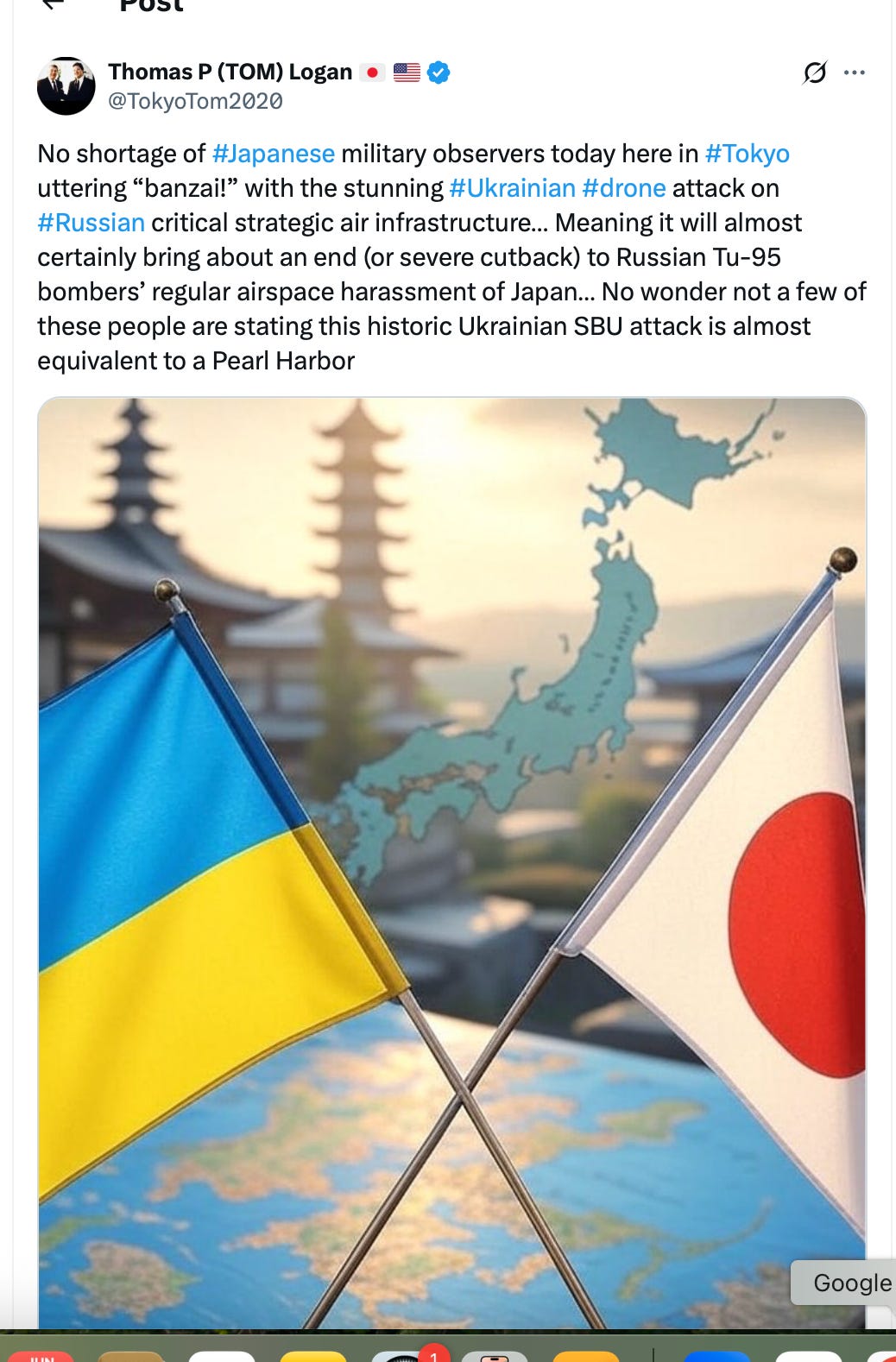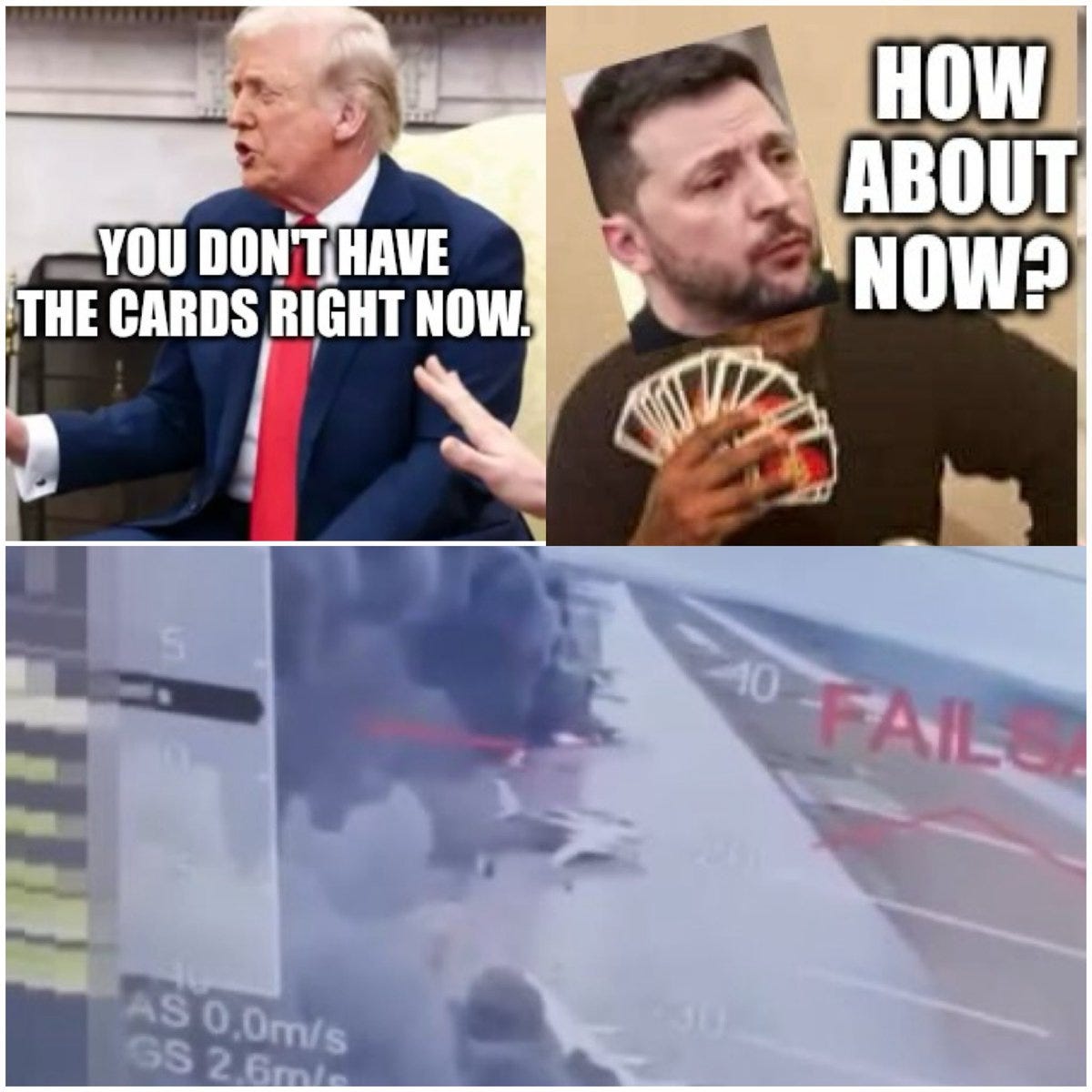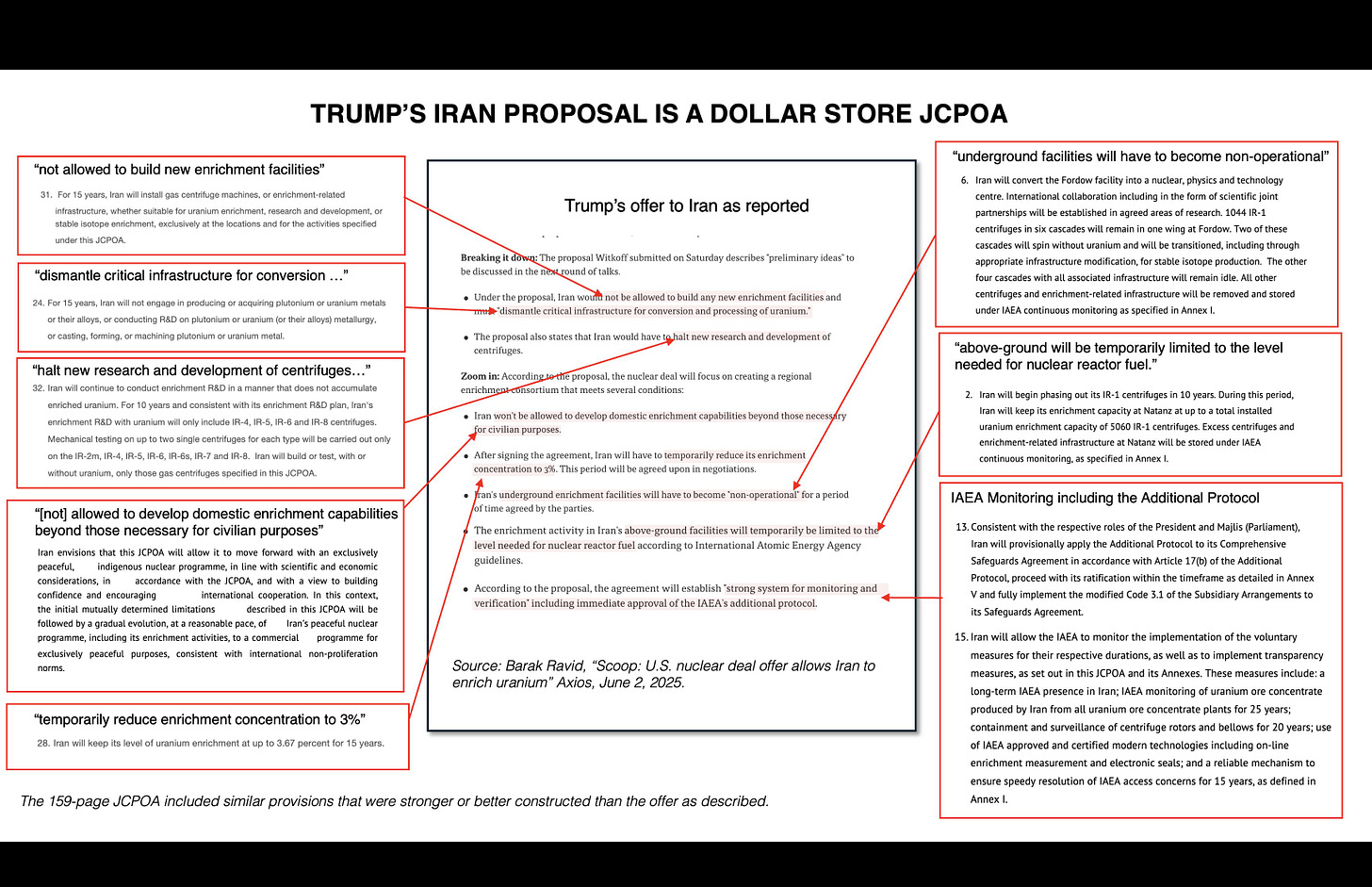Ukraine's Trojan Trucks
Ukraine knocked out one of the legs of Russia's nuclear triad. This is astonishing. It is also a revolution in military affairs. And it is profoundly destabilizing.
Yesterday, Ukraine executed a meticulously planned and astonishing drone assault deep within Russian territory. It targeted five strategic airbases—Belaya, Dyagilevo, Ivanovo Severny, Olenya, and Ukrainka—and severely degraded one of the legs of Russia’s nuclear triad. These airbases are thousands of kilometers from Ukraine. Some are as far away as Irkutsk Oblast in Siberia and Murmansk Oblast in the Arctic. They were supposed to be completely impregnable.
The attack destroyed, or severely damaged, more than 40 Russian military aircraft, including Tu-95 and Tu-22M3 strategic bombers, as well as A-50 airborne early warning and control aircraft. The bombers were designed to carry out nuclear attacks on NATO. These aircraft have inflicted utter horror on Syrian and Ukrainian civilians. No weapons in the world more deserved to be destroyed. The world is much better off now that they’re gone. Ukraine did us all a great favor.


Vasyl Malyuk, head of Ukraine’s Security Service, the SBU, planned and orchestrated the operation—codenamed—“Operation Spiderweb”—with his staff. Zelensky personally supervised it. The operation, Zelensky said, was the culmination of 18 months of planning, meaning he knew this was in the works while Trump and Vance were berating him in the White House and telling him his cards were no good. (As Zelensky said, he’s not playing cards.)
The drones were concealed within mobile wooden structures, mounted on trucks. The SBU says they were covertly transported into Russia by unsuspecting Russian civilians. (I wonder if that’s true. Maybe there are more partisans in Russia than we realized?) The trucks were parked near the Russian air bases. Then, at the appointed time, their roofs simultaneously slid open and 117 AI-guided first-person view drones sailed out. The targets were annihilated.
This is a massive blow to Russia’s strategic aviation capabilities. Ukrainian sources say some 34 percent of Russia’s strategic bomber fleet has been incapacitated. The Tu-95 and Tu-22M3 bombers are essential components of the air-based leg of Russia’s nuclear triad, and they can’t be replaced because, following the Soviet Union’s dissolution, Russia stopped making them. Ukraine estimates that the attack did US$7 billion worth of damage. The drones? I’d guess they cost no more than a million bucks to build. And they were made from cheap consumer parts.
The Tu-95s are primarily used for cruise missile delivery and strategic bombing, but they also serve—or served—as a flexible nuclear deterrent, which is particularly useful for signaling in times of geopolitical crisis. Their destruction means Russia’s nuclear flexibility, particularly its ability to conduct long-range conventional or nuclear strikes without relying solely on ballistic missile forces, has been reduced. So has its second-strike credibility, particularly in a scenario of extended conflict, and this undermines Putin’s ability to threaten everyone with nuclear annihilation, which he’s long been doing to great psychological effect. This is particularly significant given recent NATO exercises simulating nuclear response scenarios.
That Ukrainian forces managed to reach airbases thousands of kilometers inside Russian territory means there are some dead-serious gaps in Russia’s early warning, air defense, and internal security. The implications are vast. Russia likes to style itself as a global power on par with the US or China, so this is unbearably humiliating. How can Russia credibly project power abroad if it can’t even secure its own rear? States relying on Russian military protection, like Belarus and its African clients, might now begin to wonder whether Russian technology and protection is all that valuable. China has been deeply attentive to Russian military performance, and it will certainly note the vulnerability of its strategic platforms to drone swarms. India may wish to reconsider its military procurement: The debacle raises some pretty serious concerns about Russian air defense and maintenance standards.
It also exposes the idea of strategic depth as a myth. Russia has long relied on geographic vastness to secure its assets. The success of this strike means that geography just doesn’t confer protection the way it once did.
Those bombers weren’t just nuclear-capable. They were critical for long-range conventional bombardment, particularly in Russia’s missile and glide bomb attacks against Ukrainian infrastructure. This will have consequences for Russia’s operational tempo in Ukraine: Moscow’s ability to maintain pressure on Ukrainian power grids, transport hubs, and military installations is now impaired, and this could well shift the momentum of the war.
Also, Russia has lost its reserve capacity. If a crisis emerges in the Arctic, the Far East, or Central Asia, Russia’s ability to respond conventionally with airpower is substantially diminished. All of Europe, obviously, can sleep better as a result. (I’ll bet Finland, in particular, is heaving a great sigh of relief.)
The asymmetry in the powers is especially significant. Obviously, it shows how much AI-guided, first-person-view drones are reshaping warfare, particularly when they’re used creatively. In effect, we’re looking at a democratization of strategic capability—if a country without nuclear weapons or strategic bombers can degrade a nuclear power’s strategic assets, deep within that country’s borders, the world is a very different place.
Ukraine has proven itself capable of conducting complex, long-range operations—without our weapons and without our permission. It can strike the highest of high-value targets within Russia. Not only did the operation degrade Russia’s prized military assets, it struck a massive psychological blow. Russia thought its strategic forces invulnerable. Obviously, they’re not.
I just hope it has a similar effect on us—because it damned well should. We’re no less vulnerable. I hope the Pentagon is in an outright panic, frankly, because now is the time to be in it. We really shouldn’t wait until our own airbases lie in smoking ruins.
The Russian military is in a tailspin, confused, dumbfounded, hurling recriminations at one another. Russia’s air defense systems have been exposed as worthless: Those drones got deep into Russian airspace, and nothing intercepted them. What’s more, everyone in Russia—and that means everyone, including Putin—has to be thinking that there could be more of them. They must be looking at every truck they see and wondering just what’s about to fly out of it.
The operation is being likened to D-Day—and to Pearl Harbor (a comparison people might wish to think about before using), and to Israel’s destruction of the Egyptian Air Force, and to the Tet Offensive. The most apt comparison might be to the 1905 Battle of Tsushima: It was the first naval battle with modern warships in the Russo-Japan War, and the Russian fleet was annihilated. Whatever the comparison, the heroism and tenacity of Ukraine’s military are obvious.
I was curious to know what the US President thought of this, but he seems too preoccupied by the shock revelation that Joe Biden was murdered in 2020 and replaced by an android to have given it much thought.
Kyiv kept the US in the dark, or so Pentagon sources say. There’s good reason to think this true: I can’t imagine why Ukrainians would have told us, given that Trump is on Russia’s side, and if you entrust a secret to Pete Hegseth, he puts it on Signal and sends it to his personal trainer, his hairstylist, and his new friend Olga from Happy Hour. You may as well just put it in skywriting over Moscow.
On the other hand, if we had no inkling of it, who provided the intelligence and satellite data Ukraine must have used to direct this swarm? Whatever the case, given this was in the works for 18 months yet caught Russia completely unawares, the number of people who knew about this must have been very limited—and limited to people who know how to keep a secret—so this rules out the US President and his cabinet. It may not rule out people lower in the hierarchy, but if they were acting on their own, that’s an obvious problem. (One of many on our hands, mind you, and not even not the worst, and not even close.)
If we really had no idea this was coming, it’s a very serious intelligence failure. But no surprise. Our intelligence services are in turmoil. Tulsi Gabbard is at the helm. Our most experienced analysts have been fired for reporting that Tren de Aragua isn’t, actually, acting on the orders of Venezuela’s regime. Trump doesn’t pay any attention to intelligence reports, anyway, so who at this point would be motivated to write them?1 Or to take the risks required to gather intelligence?
Roll it around in your head for a moment—we did not know that Ukraine was about to wipe out a critical leg of Russia’s nuclear triad. This is the kind of thing we can’t afford not to know. Destroying a paranoid nuclear state’s ability to deliver its nukes could well have triggered a nuclear response. What if Putin had concluded Russia was under attack by us?
Under normal circumstances, we would be appalled by an intelligence failure like this. Congress would be summoning witnesses. A commission would be formed. Heads would roll. But these aren’t normal circumstances. So let’s just be glad we’re all still here.
The operation coincided with the so-called peace talks in Istanbul. The news must have changed the mood of those talks, to say the least, but it didn’t change the outcome—Russia is still stalling. I’m sure Russia expected Kyiv and its allies to be demoralized by the pace of Russian advances in Ukraine and the indiscriminate bombardment of Ukrainian cities. Instead, Ukraine is glowing with satisfaction and its allies are awestruck by its ingenuity and resilience.
Like Prigozhin’s mutiny and the invasion of Kursk, the attack is yet more proof of Putin’s weakness. He could not defend his most vital strategic assets. There’s not enough propaganda in the world to disguise this humiliation from ordinary Russians. But is there enough to disguise it from Americans, I wonder? To the rest of the world, Trump now looks even more ridiculous and pathetic for making cow-eyes at a murderous dictator. Will it now be obvious to his supporters that Trump backed the wrong side? Probably not, I suppose.
This is bound to be destabilizing in Russia. The rivalries among the Ministry of Defense, the FSB, the GRU, and private actors are sure to intensify: Who failed to protect Russian skies? Putin’s image as the head of a ruthless military machine has been left in tatters, abroad and at home. When Russia’s economy crashes, as I suspect it will soon do, it will all be over. My money is on Russia collapsing in the economic chaos. Vicious factional conflict among all who rose under Putin’s miserable regime will ensue. That will be an extraordinarily dangerous moment—and it’s also predictable, and we should be planning for it.
We were so fortunate that when the Soviet Union collapsed, George H.W. Bush was in power. It was a miracle that so little blood was shed. Under normal circumstances, the US government—and the State Department, the Pentagon, and our intelligence agencies—would now be working around the clock on contingency plans. They would be preparing to secure the nukes. They would be working the phones non-stop to shore up our European alliances and figure out who, in Russia, is apt to take over, and whether we might be able to do business with him. Maybe they’re doing all of this. But I expect they’re doing no such thing. What scarce resources we have left after the purges have, I reckon, been assigned to dream up new ways to terrorize migrant grape-pickers.
We have a profound interest in what happens next in Russia. It could be something even worse than Putin. But it doesn’t need to be.
We have a profound interest in trying to stabilize Russia as soon as it gets its filthy mitts off Ukraine. Of course, the idea that Trump would so much as entertain this idea, let alone competently supervise a complex plan to prevent Russia from becoming a nuclear failed state, is laughable. It’s quite extraordinary: We have the worst president we could even conceivably have for a moment like this.
My God, I hope the US military is taking careful note of what just happened. Our airbases, around the world, are just as vulnerable to attacks like these. Does it even make sense to keep spending trillions of dollars on the world’s most sophisticated military hardware if it can be taken out by drones within minutes? Are any of the things we spend all this money on worth it? Maybe we just need a few good subs and a whole bunch of drones?
It’s really quite a lot to take in: A bunch of cheap drones took out a significant part of Russia’s ability to deliver a nuclear attack. I haven’t begun to consider all the military ramifications of this, but obviously I need to rethink everything I know about strategy and deterrence.
The strategic embarrassment for Russia genuinely has the potential to change both the outcome of the war in Ukraine and Russia’s regime and Russia’s broader, sinister role in the world. It means Moscow can no longer rely on its historical advantages—geography, legacy hardware, centralized command systems. Probably someday soon, given climate change, it won’t even be able to count on General Winter. I don’t want to make overly confident predictions, but it sure looks like Russia is now well on the way to becoming the utterly irrelevant Chinese gas station it was always meant to be.
But this really cuts both ways. We can’t rely on our historical advantages, either—not if we understand these the way Russia does. Our geography, legacy hardware, and habits won’t do us any more good than they’ve done Moscow.
If we understand our historical advantages correctly, however—if we understand that we’ve historically relied on immigrant talent, on brain-draining the best people from around the world, on the new technology that emerges from our universities, on a culture that values improvisation and adaptation, one relatively free of corruption, one that encourages rather than stifles criticism—we’ll be able to adapt. But this is not the path we’re on. It’s the opposite of the path we’re on. Trump, in fact, seems determined to import every one of the pathologies that just cost Russia its bombers.
The advent of this kind of warfare will necessitate wholesale doctrinal revolutions—not just in Russia, but all over the world. Cold War arsenals, ours and Russia’s alike, are demonstrably vulnerable to distributed, autonomous attacks. This means things have to change.
Is our leadership remotely capable of superintending over such a thing? Our Secretary of Defense looks far too busy spray-tanning and waging war on DEI to do much by way of coming up with new military doctrines. Can the Pentagon just ignore him and get on with what it obviously needs to do? I truly don’t know. Perhaps someone who has spent time in the military can tell me how likely that is.
I have to figure there are still plenty of people in the Pentagon who grasp that this is an earthquake and that we need to change everything in response to it. Will the administration leave them in peace and let them get on with their grown-up jobs? Or will the military now be too busy planning parades for Trump’s birthday? I suppose we’ll find out.
Meanwhile, I’m going for a walk.
Also of note:
It’s taco time! US nuclear deal offer allows Iran to enrich uranium. Looks like we’re proposing a weaker version of the JCPOA.
AFRICOM asks for help deterring terrorism after Trump pulls aid to allied countries. Groups like al-Shabaab see USAID withdrawal as an opportunity.
Victor Gao, former translator for Deng Xiaoping:
Ladies and Gentlemen, the President of the United States: “Trump could get Fox News-style intel briefings because he ‘doesn’t read.’”
President Donald Trump’s National Intelligence Director Tulsi Gabbard is looking for ways to change the president’s intelligence briefings to align with his media consumption habits and gain his trust, possibly adopting a video format, NBC News reports.
Gabbard has apparently consulted current and former intelligence officials for solutions. One possibility would be to turn the briefings into videos styled after Fox News, four sources told the outlet in its report published Saturday. The President’s Daily Brief, or PDB, is currently a daily digital document containing text, graphics, and images. In order to carry out this new approach, the national intelligence director’s office could even hire one of Fox News’ talking heads and one of the network’s producers. …
Another idea for the PDB would be to include graphics and maps with animations of exploding bombs “similar to a video game,” per NBC News’ report.












Best thing I've read on this subject thus far.
Wild to watch warfare change at such speed.
I love how this attack exposes Russia’s inability to rebuild many of those planes. They are so much weaker today than they were as the Soviet Union and the takeaway is clearly they can’t be allowed to rebuild those capabilities and their empire because they are legit terrorists.
And what a brave new world militarily overnight. Occurs to me that aircraft carriers seem particularly exposed. Submarine and stealth airborne drone carriers are def going to be a thing, maybe even drones within missiles. Delivering these tools close to targets is going to be a huge arena for innovation. And defensive drones are going to need to be innovated to counter all this.
Slava Ukraini!